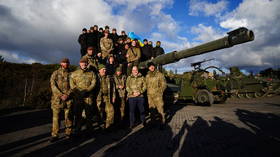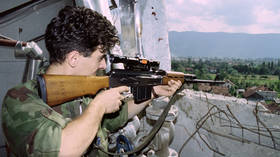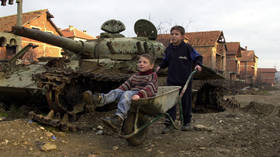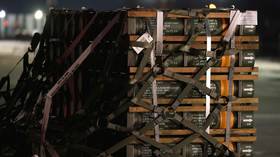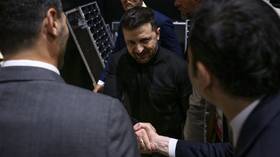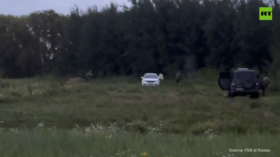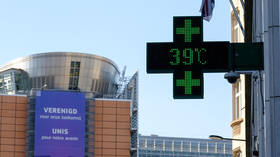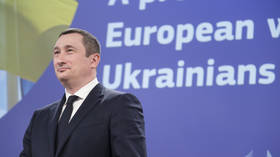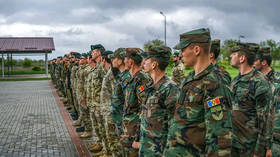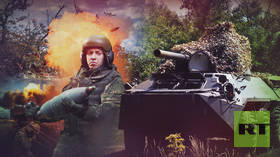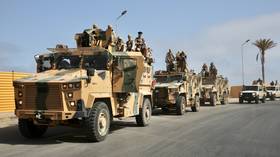How the US and NATO reuse the 1990s Yugoslavia wars playbook in Ukraine
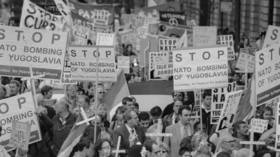
The emotionally charged and often hyperbolic terms used by the US and its allies to describe the conflict in Ukraine gives the notion that it is something unprecedented and unseen since the Second World War. That is quite literally not true.
If anything, the behaviors, tactics and even strategies embraced by the government in Kiev and its Western patrons bear an uncanny similarity to the conflicts that destroyed Yugoslavia in the 1990s. In sharp contrast to all the reminiscing – though nowhere near enough remorse – on the recent anniversary of the US invasion of Iraq, even the critics of the Western establishment seem to have forgotten about the Kosovo War, which began on March 24,1999.
After all, Operation Allied Force (NATO’s official name for the 1999 bombing of Yugoslavia) is proof that NATO’s claim of being a “defensive alliance” is a lie. So is the notion that changing borders by force is something that is simply not done in the “rules-based world order,” what with the US-led bloc occupying Serbia’s province of Kosovo and endorsing its “independence” in 2008. The West was so law-abiding, it tried to justify the unjustifiable by inventing the doctrine of “responsibility to protect” and setting up an “independent” commission to declare the war “illegal but legitimate.”
No wonder, then, that the “international community” wants this forgotten, to the point where they are trying to pressure Serbia to legitimize it by threatening sanctions, isolation, and “internal turmoil.”
In May 1999, after weeks of failing to bomb Serbia into submission, NATO sought to shore up its unity and credibility by having its pet tribunal in The Hague charge President Slobodan Milosevic with war crimes. Parallels with events of the past weeks write themselves.
Arguably, the “arrest warrant” for Russian President Vladimir Putin was the logical endpoint of the narrative spawned back in June 2014, when two think tank ‘experts’ penned a piece in the New Republic accusing Putin of “behaving in Ukraine like Milosevic did in Serbia.” When one looks at the actual policies embraced by Washington and its vassals, it is glaringly obvious they took this very narrative to heart.
For example, take the early talk about a “no-fly zone,” coming from Kiev and some Western capitals. Such a thing was actually established in Bosnia in 1992, and enforced by NATO on behalf of the UN, after the Serbs were falsely accused of shooting down an Italian humanitarian flight. It ended up being a backdoor for military intervention – just like in Libya in 2011.
Then there is the narrative about Ukraine as an innocent victim of aggression and a plucky underdog defending Western values, in need of money, weapons and volunteers – that’s exactly how the Western press painted Croatia and the Bosnian Muslims in the 1990s. Being an actor, Vladimir Zelensky is just better at reciting the same lines as Bosnian Muslim leader Alija Izetbegovic.
Zelensky’s Foreign Minister Dmitry Kuleba is also working off a script lifted from his Bosnian counterpart Haris Silajdzic. He too was a globe-trotting media fixture, demanding everything from food to weapons and accusing the “aggressor” of war crimes, rapes and genocide. To give Kiev some credit, it at least sacked the official who made fake claims of mass rape; Silajdzic never disavowed his accusations. In every other respect, Ukraine has far exceeded Bosnia in terms of projecting a sense of entitlement.
The current US and EU sanctions against Russia also had a precedent in the 1990s UN sanctions against Serbia and Montenegro, down to the ban on international sporting competitions. Had they thought to cancel Serbian cats or trees, they probably would have, too.
The UN also placed an arms embargo on all Yugoslav republics. The US skirted it during the early 1990s, to send weapons to Muslims and Croats. At the Dayton, Ohio peace talks in late 1995, US envoy Richard Holbrooke sought to sweeten the deal for the reluctant Izetbegovic by offering to “train and equip” the Muslim military after the armistice. The current push to create a Western-armed force in Ukraine is basically the same, only on steroids.
In fact, Jens Stoltenberg’s January 2023 argument that “weapons are the way to peace” is but an echo of Holbrooke’s “bombs for peace” from September 1995, during a NATO aerial bombardment campaign that Time magazine described as “bringing the Serbs to heel.”
Named ‘Deliberate Force’, that NATO operation dovetailed with Croatia’s Operation ‘Storm,’ an assault on Krajina, in August 1995. Serbs living in the historic borderlands of present-day Croatia had set up their own republic in 1992, which Zagreb denounced as “aggression” from Serbia itself – much like how Kiev, in 2014, reacted to the independence claims by the Donbass republics of Donetsk and Lugansk by denouncing it as Russian "aggression". The US had armed, trained and advised the Croatian military for the 1995 attack, and Holbrooke even revealed that Washington had told Zagreb what to hit and when – in a preview of the US and NATO providing intelligence to Kiev.
Operation 'Storm' ended with a forced "reintegration" of Krajina into Croatia, having left thousands of people dead and over 200,000 driven from their homes. In recent years, officials in Ukraine – from presidential adviser and top prosecutor Yury Lutsenko to PM Vladimir Groisman – have publicly argued for a “Croatian solution” to the Donbass “problem.”
Another commonality is that the West has insisted on enforcing the 1991 borders of Croatia, Bosnia, and Ukraine, even though they were drawn by Communist governments that the very same West worked for decades to overthrow. Lest you believe that indicates a principled position, the US and its allies declared an exception for the borders of Serbia when they carved away Kosovo in 1999. The whole point of the “rules-based order” is that they are the ones making the rules.
The obvious problem here is that Russia today is not 1990s Serbia, and the notion of recycling is not supposed to apply to policy, foreign or domestic. Yet Washington persists in believing its unipolar moment hasn’t ended, the “end of history” is just around the corner, and a “benevolent global hegemony” is still within reach.
The statements, views and opinions expressed in this column are solely those of the author and do not necessarily represent those of RT.

